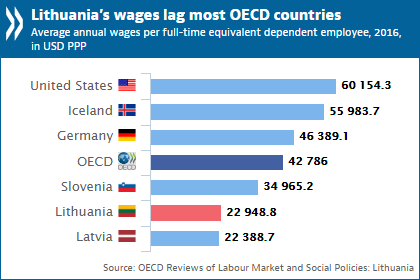Lithuania needs to address its demographic challenge and boost job quality
Lithuania’s economy has recovered strongly from the global financial crisis, with GDP, wages and employment levels back up to their pre-crisis levels. The country should now focus on tackling the demographic challenge of a fast-declining population and making the job market more inclusive, according to a new OECD report.

OECD Review of Labour Market and Social Policies: Lithuania says that the population has been declining by more than 1% annually since the early 2000s, as people leave to seek better-paid quality jobs abroad. The working-age population is forecast to decline by about 9% between 2015 and 2020, and by a further 20% in the 2020s. The old-age dependency ratio is thus expected to increase from 28 old-age people for every hundred working-age residents in 2015 to 46 in 2030, a sharper increase than in most OECD countries.
Wage gaps with other European countries are closing too slowly to suggest that emigration will decline soon, according to the report. Income inequality is also very high and the poorest households have seen little improvement in their living standards over the last years.
“To better share the fruits of economic growth, labour market inequalities and large regional disparities in employment and educational outcomes must be addressed,” said Stefano Scarpetta, OECD Director for Employment, Labour and Social Affairs, launching the report in Vilnius with Linas Kukuraitis, Lithuania’s Minister for Social Security and Labour. “Moreover, efforts should be made to enhance job quality, given the still widespread informal employment and low wages. The share of informal workers not covered by social security or labour laws is higher than in any other EU country except Latvia.”
“Becoming a member of the Organisation for Economic Co-operation and Development is one of the most important strategic goals of Lithuania,” said Linas Kukuraitis, Lithuania’s Minister for Social Security and Labour. “We are glad that part of the OECD‘s recommendations for Lithuania are already being implemented. For example, the reform of Lithuanian Labour Exchange, increasing the adequacy of cash social assistance by increasing the amount of state supported income and introducing the amount of minimum consumption needs calculation methodology.”
Recent reforms of the Labour Code, the unemployment insurance system, employment policies, minimum-income benefits and public pensions have reduced incentives for informal employment and raised income security. However, resources devoted to labour market and social policies remain limited.
To boost social spending and finance active labour market programmes, tax revenues need to be raised. Changing the tax structure to make the personal income tax system more progressive would help lower inequality, as would introducing higher property, capital gains and environmental taxes.
More needs to be done to attract emigrants to come back. Return rates are less than 40% for the migrants who left in 2010, and later emigrants are less likely to return. Among those who do return, more than two-thirds do not work, making them more likely to leave again. The Global Lithuania programme, designed to ensure the continued involvement of the diaspora in the life of the state, is currently underfunded and needs to be better resourced, especially to support returning workers. More efforts should also be made to promote job opportunities to Lithuanians unsatisfied with their jobs abroad.
The OECD also recommends that Lithuania:
● Monitor developments in job quality following the adoption of the new Labour Code as well as the effects of work councils formation on trade unions, and take corrective action if needed;
● Strengthen policies to reduce informality and improve occupational health and step up sanctions against employers who violate legislation;
● Increase support for jobseekers by boosting resources in the public employment service and increasing participation in training programmes, especially for older workers;
● Improve social protection by extending the maximum duration of unemployment benefit, further raising Cash Social Assistance and increasing tax subsidies for the public pension system to limit the rise in old-age poverty.
Source: Organization for Economic Co-operation and Development
- 289 reads
Human Rights
Ringing FOWPAL’s Peace Bell for the World:Nobel Peace Prize Laureates’ Visions and Actions

Protecting the World’s Cultural Diversity for a Sustainable Future

The Peace Bell Resonates at the 27th Eurasian Economic Summit

Declaration of World Day of the Power of Hope Endorsed by People in 158 Nations

Puppet Show I International Friendship Day 2020

